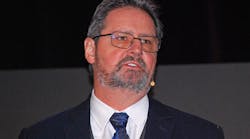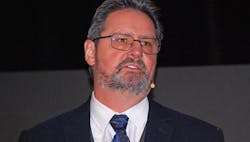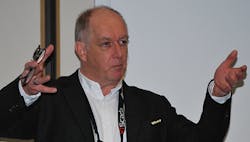“The Delta acquisition is helping us to create solutions unavailable before.” Barry Baker, vice president and leader of North America operations for VTScada by Trihedral, kicked off VTScadaFest 2022.
After two years of pandemic-induced distancing, the team behind VTScada by Trihedral had big news to share when they gathered with more than 200 users of the company’s namesake supervisory control and data acquisition (SCADA) software for VTScadaFest 2022, held March 21-25 in Orlando.
In addition to an impressive range of new functionality soon to be available in release 12.1, as well as certification to the IEC’s 62443-4-1 standard for cybersecure development processes, the company was able for the first time to discuss in person the implications of its May 30, 2020, acquisition by Delta Electronics.
“Great moments are born from great opportunities,” began Barry Baker, vice president and leader of the company’s U.S. organization in VTScadaFest’s keynote address, quoting Herb Brooks, coach of the U.S. Olympic hockey that in 1980 upset a highly favored Soviet team enroute to the gold medal at Lake Placid. “An underdog really can overcome more advanced foes,” Baker said.
New resources, new reach
In actuality, it may soon be difficult to call the Halifax, Nova Scotia-based software provider an underdog, given the resources of its new $11 billion parent. Delta Electronics specializes in industrial as well as building automation, telecommunications and power electronics hardware—much of which comes to market private labelled by leading brands in the industrial automation space.
The acquisition represents a key part of Delta’s long-term strategy in its industrial automation and system integration portfolios, Delta stated in a press release issued at the time of the acquisition, and is “expected to help facilitate a broader business in digitized manufacturing.” Delta plans to use its existing global sales and service network to expand Trihedral’s signature VTScada software solution globally. “Integrating Delta hardware and Trihedral software will allow both to play on their strengths in the rapidly growing fields of automation, artificial intelligence and data analytics,” according to the company.
“It’s not intrusion detection, it’s not network monitoring and it won’t manipulate traffic. It doesn’t give a solution, but with the knowledge it provides you can solve problems.” VTScada Developer Graham Bloice, early contributor to the open-source Wireshark packet inspection tool introduced VTScadaFest attendees to the application that millions of downloaders each month are discovering.
“The Delta acquisition is helping us to create solutions unavailable before,” added Baker. “Over the past two years we’ve found core alignment with Delta—both organizations are striving for change, pursuing sustainability,” he said. “Now, we’re part of an enterprise with 88,000 staff around the world, including 400 Delta engineers trained in VTScada. Delta also ‘eats its own dogfood’—with Delta factories now using VTScada, testing and using it every day.”
Baker also reported an impressive series of project wins in 2021, which represented the latest “best year ever” in a long string of them. The company added an enterprise level agreement with Ontario Power Generation, plant energy monitoring for Toyota Motors’ North American fleet of factories, an energy monitoring infrastructure project for the Western Power Distribution in the U.K.—including telemetry, renewables and electric vehicle charging—as well as supervision of the St. Lawrence Seaway in Canada and Macao tunnels in China
Certification of cybersecure work practices
Baker also reported that Trihedral’s VTScada development environment was recently certified to be in compliance with the IEC 62443-4-1 cybersecurity standard for industrial automation and control systems. The standard applies specifically to work processes and development practices. “Certification to the standard indicates that our practices are conducive to a secure development lifecycle,” Baker said. “With any new feature, we look at security first.”
“We cleared the audit pretty quickly in part because we’ve long employed processes designed to ensure the quality and security of our software releases,” he added during a post-keynote session focused on the ins and outs of IEC 62443-4-1. “That means extensive testing to catch any issues before they go out to our users, including design reviews before coding begins, and coding reviews by someone other than the person who developed it."
One example of this philosophy is the practice of not embedding third-party code in VTScada. This is chiefly because licensing and development of third-party code is not under the company’s direct control, plus off-the-shelf IT code typically is not developed with the long lifecycle expectations of OT systems in mind. Nor do potential cybersecurity vulnerabilities normally have quite the impact on general IT systems that they do in the critical infrastructure applications typical of VTScada’s client applications.
The company does securely integrate with applications that are outside VTScada’s core functionality, Baker added, offering a cautionary tale. “It was a third-party application for doing voice-based alarm notifications over the telephone that we looked at integrating into our platform,” he explained. It had a more pleasant and less robotic voice than most of the alternatives, but suddenly the provider notified Trihedral that they’d no longer be licensing it. “Soon afterwards, we realized our old voice software was now named Alexa,” Baker said. “Now just imagine if that software had been essential to a core functionality embedded deep within our product?”
Highlights of the rest of VTScadaFest week included extensive training sessions, deep dives into the new functionality offered in release 12.1 and an update on the rapidly evolving cybersecurity landscape. Other sessions of note included Founder and President Glenn Wadden’s musings on the development philosophy that underlies VTScada and an exploration of mission critical teamwork by Pete Diffley, global partnerships leader.








